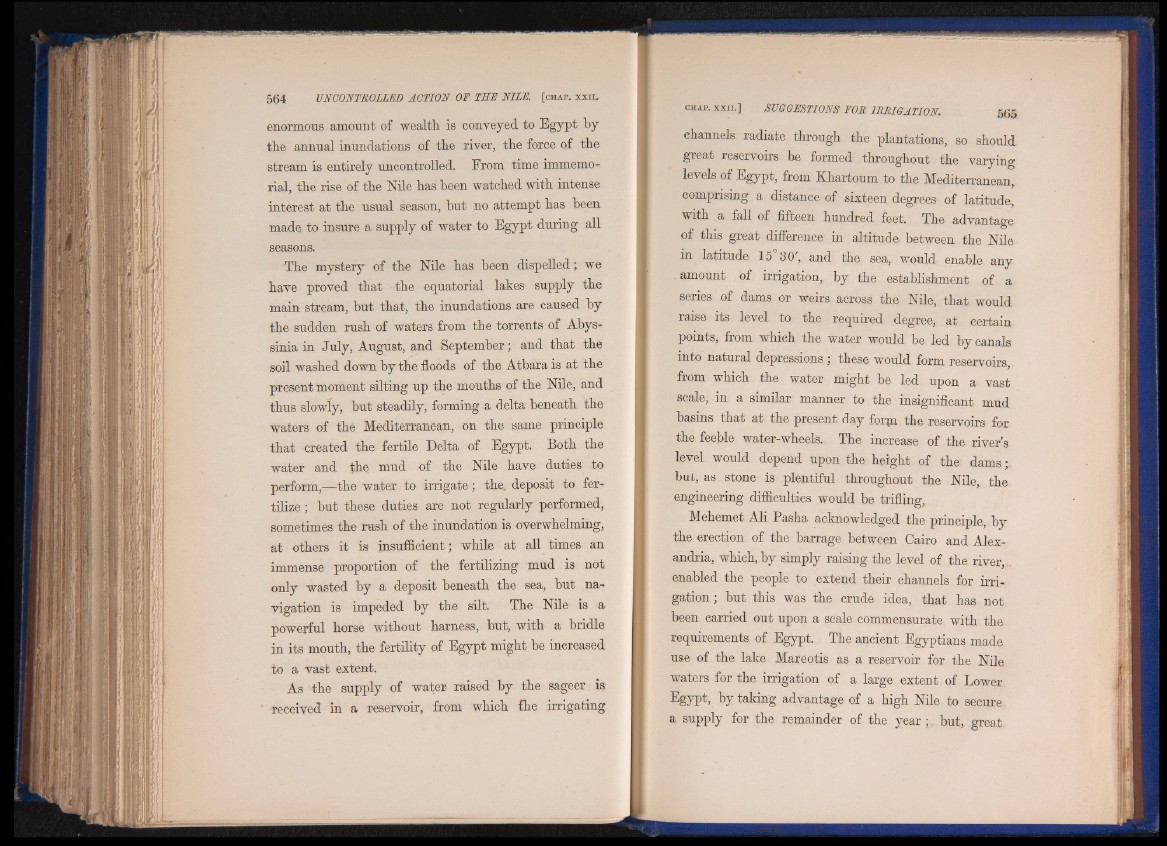
enormous amount of wealth is conveyed to Egypt hy
the annual inundations of the river, the force of the
stream is entirely uncontrolled. From time immemorial,
the rise of the Nile has been watched with intense
interest at the usual season, hut no attempt has been
made to insure a supply of water to Egypt during all
seasons.
The mystery of the Nile has been dispelled; we
have proved that the equatorial lakes supply the
main stream, but that, the inundations are caused by
the sudden rush of waters from the torrents of Abyssinia
in July, August, and September; and that the
soil washed down by the floods of the Atbara is at the
present moment silting up the mouths of the Nile, and
thus slowly, but steadily, forming a delta beneath the
waters of the Mediterranean, on the same principle
that created the fertile Delta of Egypt. Both the
water and the mud of the Nile have duties to
perform,—the water to irrigate; the. deposit to fertilize;
but these duties are not regularly performed,
sometimes the rush of the inundation is overwhelming,
at others it is insufficient; while at all times an
immense proportion of the fertilizing mud is not
only wasted by a deposit beneath the sea, but navigation
is impeded by the silt. The Nile is a
powerful horse without harness, but, with a bridle
in its mouth, the fertility of Egypt might be increased
to a vast extent.
As the supply of water- raised by the sageer is
received in a reservoir, from which fhe irrigating
channels radiate through the plantations, so should
great reservoirs be formed throughout the varying
levels of Egypt, from Khartoum to the Mediterranean,
comprising a distance of sixteen degrees of latitude,
with a fall of fifteen hundred feet. The advantage
of this great difference in altitude between the Nile
in latitude 15 30', and the sea, would enable any
amount of irrigation, by the establishment of a
series of dams or weirs across the Nile, that would
raise its level to the required degree, at certain
points, from which the water would be led by canals
into natural depressions jj these would form reservoirs,
from which the water might be led upon a vast
scale, in a similar manner to the insignificant mud
basins that at the present day form the reservoirs for
the feeble water-wheels. The increase of the river’s
level would depend upon the height of the dams;
but, as stone is plentiful throughout the Nile, the
engineering difficulties would be trifling,
Mehemet Ali Pasha acknowledged the principle, by
the erection of the barrage between Cairo and Alexandria,
which, by simply raising the level of the river,
enabled the people to extend their channels for irrigation
; but this was the crude idea, that has not
been carried out upon a scale commensurate with the
requirements of Egypt. The ancient Egyptians made
use of the lake Mareotis as a reservoir for the Nile
waters for the irrigation of a large extent of Lower
Egypt, by taking advantage of a high Nile to secure
a supply for the remainder of the year; but, great